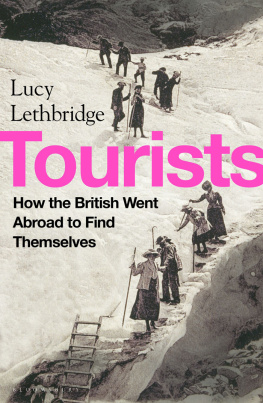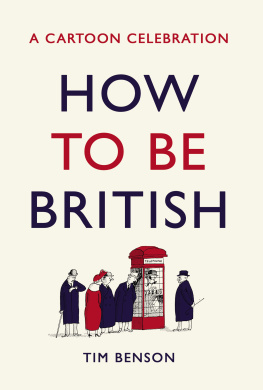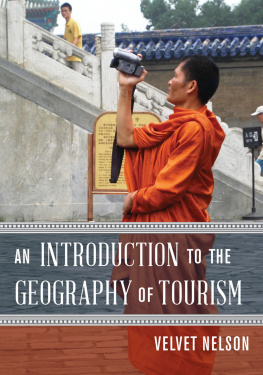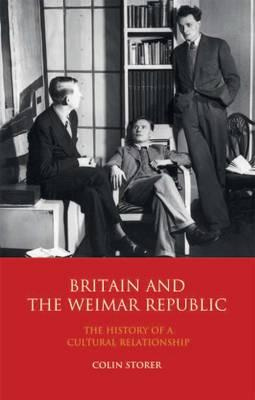Tourists

BLOOMSBURY PUBLISHING
Bloomsbury Publishing Plc
50 Bedford Square, London, WC1B 3DP, UK
29 Earlsfort Terrace, Dublin 2, Ireland
BLOOMSBURY, BLOOMSBURY PUBLISHING and the Diana logo are trademarks of Bloomsbury Publishing Plc
First published in Great Britain 2022
This electronic edition first published in 2022
Copyright Lucy Lethbridge, 2022
Lucy Lethbridge has asserted her right under the Copyright, Designs and Patents Act, 1988, to be identified as Author of this work
All rights reserved. No part of this publication may be reproduced or transmitted in any form or by any means, electronic or mechanical, including photocopying, recording, or any information storage or retrieval system, without prior permission in writing from the publishers
Bloomsbury Publishing Plc does not have any control over, or responsibility for, any third-party websites referred to or in this book. All internet addresses given in this book were correct at the time of going to press. The author and publisher regret any inconvenience caused if addresses have changed or sites have ceased to exist, but can accept no responsibility for any such changes
A catalogue record for this book is available from the British Library
ISBN: HB: 978-1-4088-5622-2; EBOOK: 978-1-4088-5621-5; EPDF: 978-1-5266-5239-3
To find out more about our authors and books visit www.bloomsbury.com and sign up for our newsletters
For Caspar and Anna
Contents
Its raining Englishmen! wrote Prince Metternich in Paris in 1815, observing in astonishment the arrival of over 600 English a day in the French capital.
It had been more than ten years since the British had visited the continent in any number in fact since the brief cessation of hostilities with the French under the Peace of Amiens in 1802. Lawyer John Carr, a Devonshire man, had gone to Paris that year, reporting on his disembarkation at Le Havre that everybody he met there looked overjoyed to welcome the British: They appeared highly delighted to see us, talked of our dress, Sir Sidney Smith, the blockade, the noble English, the peace, and a train of etceteras.
This book covers the subsequent century and a half of British vagabondage. Off the tourists went, in families, groups and households, by carriage, steam packet, train, then ferry, motor car and finally aeroplane, for jaunting, for health, for education and for curiosity; and, finally, in the ultimate benediction of modern leisure: for sea and sun. It will concentrate on Europe (with the occasional foray into Turkey, Egypt and Palestine) because, although global travel expanded vastly in this period, it was the continent that was the locus of popular tourism.
The Grand Tour had been the seventeenth-century finishing school which gave the final burnish to the classical education required by the young aristocrat. The tour was as much about reading, talking and encountering important people as looking at important sights. It was about making connections that broadened the mind and consolidated a shared culture. Richard Lassels, a tutor, or bear leader, who accompanied several wealthy young men to Europe during this time, wrote that the chief object of a young man on the Grand Tour should be to experience the rare discourse we hear from learned men; on his return, the idea was that he would then reread the works of the ancient philosophers with a deeper sophistication. By the end of the eighteenth century, however, the Grand Tour was associated more in the public imagination with debauchery, with spoiled and entitled young milords and their entourages behaving badly away from home.
We are all tourists now despite what superior claims we may make for our travelling and for two centuries the Grand Tour has laid down the foundations of the European sightseeing canon. Yet all manner of intricate snobberies about the masses on the move was present from the first. There is nothing so undesirable for the high-minded traveller as the sight of his or her own countrymen and women following their guidebooks along the same path. The poet Samuel Taylor Coleridge was among many dispirited by the sight of Delinquent Travellers as a mass distraction, observing in 1818 that the hoi-polloi was on the move: peace has set John Bull a-gadding. Innumerable cartoons during this period depict the well-fed, coarse-grained British with their untidy entourages, their vulgar manners and baskets of provisions descending on the cities of Europe. These ruddy-cheeked caricatures are reminders that class distinctions are not left behind when travelling abroad; in fact they are, for the most part, reinforced.
For Coleridge, as for many commentators, the new tourists were trippers and lightweights mere excursionists. They were gadabouts and vulgarians, empty vessels agog for new experience, unreflective and undisciplined consumers, with leaky purse and open mouth.
In a foreshadowing of current anxieties about the corrupting distractions of online media, Coleridge thought that movement itself, made increasingly convenient by industrial technology, led to spiritual impoverishment and reduced attention spans:
Keep moving! Steam or Gas or Stage,
Hold, cabin, steerage, hencoops cage
Tour, Journey, Voyage, Lounge, Ride, Walk,
Skim, Sketch, Excursion, Travel-Talk
For move you must! Tis now the rage,
The law and fashion of the Age.
It was a social movement, however and with it new attitudes towards what once seemed pre-ordained by social contract that brought the real change. And the shift in the experience of work was echoed in new ideas about the definition of leisure. The historian J. A. R. Pimlott has pointed out that the numbers of traditional holy days or days off work for religious feasts enjoyed by clerical and industrial workers actually reduced dramatically in the first half of the nineteenth century. With narrow factory routines replacing more ad hoc or seasonal arrangements, and with no legal trades unions, employers could whittle down the traditional holidays that had been part of working life for centuries. The Bank of England, for example, closed on 47 days in 1761, on 44 in 1808, on 40 in 1825, on 18 in 1830 and on only 4 days in 1834. The first statutory bank holidays were not introduced until 1871. It is from a society in which work-free days were confined for the most part to Sundays that Thomas Cook, the progenitor of modern tourism and the package tour, emerges as one of the most remarkable figures of an era of remarkable self-made individuals.
The idea of the holiday gradually came to embody the idea that change of scenery, air, climate and culture was beneficial to health and spirit. And just as the tourist is the audience of a foreign culture often especially preserved for them to observe, so its familiar features can be packaged up in anticipation of the tourists arrival. The rise of popular tourism runs parallel with that of consumerism and the transformation of experience into merchandising opportunities. The tourist business put the cultures of the world up for sale in a shorthand of enticing symbols: a pyramid, a palm tree, a Roman ruin, a peasant or a mountain peak. The history of tourism is therefore inseparable from the history of mass-produced bric-a-brac in the guise of holiday souvenirs. In 1909, the Journal of Decorative Arts wondered at the ways in which the diverse cultures of the world could be reduced to repeating images: Every portion of the habitable globe, from the Arctic regions to the Torrid zones, from the tea gardens of Tokyo to the
Alongside the development of the standardised tourist experience bringing with it improvements in sanitation, desirable air-conditioning and food that although interestingly different is still sufficiently familiar as to be palatable is another, poignant strand of vagabondising: the recreation of the pastoral. This is the holiday that requires (an element of) physical hard work: it is about hiking, cycling, knapsacks, campfires and caravanning. The self-improving spirit of touristic curiosity unleashed by Thomas Cook and the madcap theatricality of Albert Smith are combined in the camping holiday or the hiking tour: it is a happy illusion of splendid solitude and ancient skills. What better delivers the wild romance of the open road as well as the cosy safety of the traditional cottage than the caravan?
Next page








